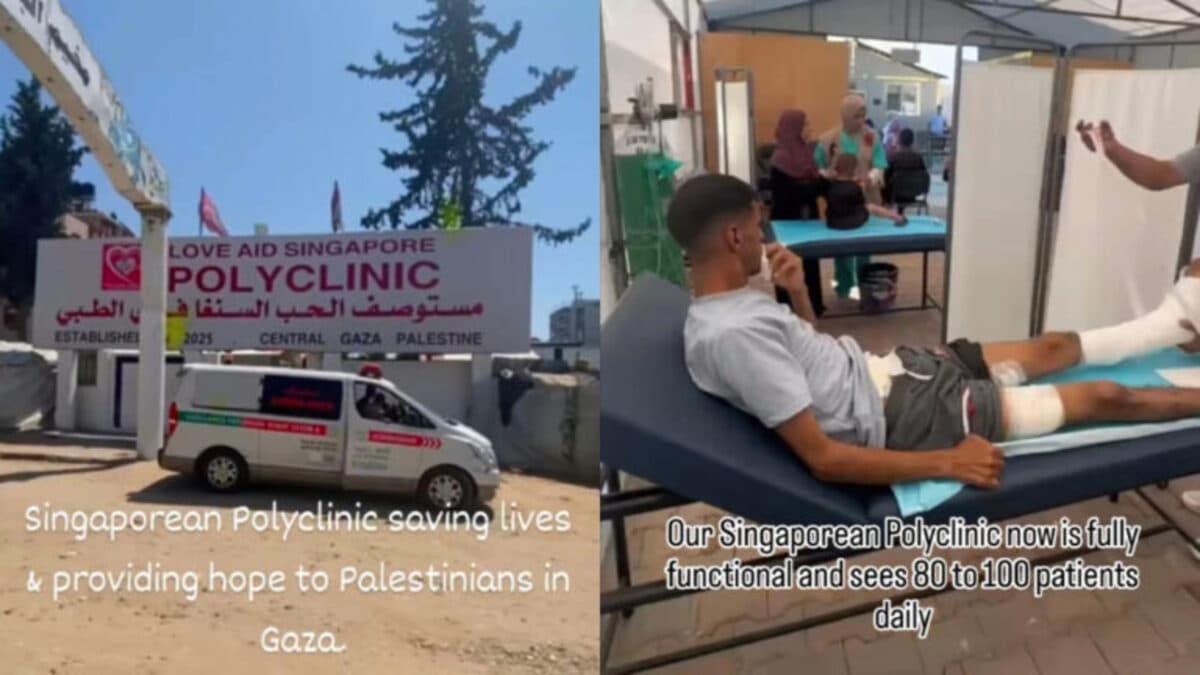Singapore-funded polyclinic opens in Gaza’s Al Bureij refugee camp, serving up to 100 patients daily
A polyclinic funded entirely by Singaporeans has begun full operations in the Al Bureij refugee camp in central Gaza, providing free medical, rehabilitation, and mental health services to residents affected by the ongoing war.

- Built through public donations via Love Aid Singapore, the clinic serves 80–100 patients a day.
- Focus areas include physical rehabilitation, general healthcare, and psychological support.
- Love Aid Singapore plans to open a second clinic in North Gaza amid worsening medical shortages.
SINGAPORE: A polyclinic funded by Singaporeans and located in the Al Bureij refugee camp in central Gaza is now fully operational, treating around 80 to 100 patients each day.
The update was shared by Singaporean activist Gilbert Goh, founder of the humanitarian group Love Aid Singapore, in an Instagram post on Thursday (3 July).
Goh said the facility was built from the ground up with donations from members of the Singaporean public, in collaboration with the group’s NGO partner in Gaza. He clarified that the Singapore government was not involved in the initiative.
“Our Singaporean Polyclinic is now fully functional and sees about 80 to 100 patients daily,” Goh wrote.
The polyclinic primarily offers rehabilitation therapy for those with mobility issues caused by injuries from the ongoing bombardment, which Goh described as part of a “genocidal war.”
In addition to rehabilitation, it provides general medical care for children and adults with common illnesses such as flu, fever, and cough. All treatments are currently offered free of charge.
Mental health support is also central to the clinic’s mission. A psychologist conducts regular sessions for residents of the Al Bureij camp, home to nearly 10,000 displaced individuals.
Women and children have been attending weekly socio-psychotherapy workshops for the past two months.
Operating costs are significant — the clinic requires S$500–S$600 per day for medication and treatment, with medical personnel salaries totalling nearly S$8,000 per month.
Goh expressed gratitude to donors:
“Thanks to the many who have donated for our polyclinic all this while.”
Love Aid Singapore is also exploring the possibility of opening a second polyclinic in North Gaza, where medical infrastructure has been devastated.
Beyond healthcare, the group funds two community kitchens in Gaza, which together serve daily meals to around 1,000 Palestinians.
WHO: Gaza’s health system near total collapse
View this post on Instagram
The World Health Organization (WHO) has warned that Gaza’s healthcare system is on the brink of collapse as Israel’s military operations intensify.
In a May 2025 report, WHO said four major hospitals — Kamal Adwan, Indonesia, Hamad for Rehabilitation and Prosthetics, and European Gaza Hospital — were forced to suspend services due to nearby hostilities and evacuation orders.
WHO has documented 697 attacks on healthcare facilities in Gaza since October 2023. Currently, only 19 of 36 hospitals remain partially operational, with just 12 providing full services.
At least 94% of all hospitals in Gaza have been damaged or destroyed.
Only 2,000 hospital beds remain for over two million residents, a number the WHO says is “grossly insufficient.” Many hospitals also lack staff, supplies, and electricity.
Since the conflict escalated on 7 October 2023, Gaza’s Health Ministry reports that over 56,500 Palestinians — including 17,400 children — have been killed, and more than 133,000 injured.







